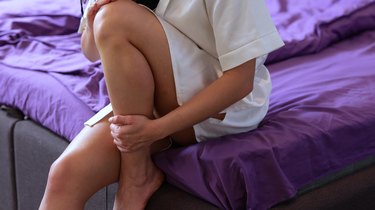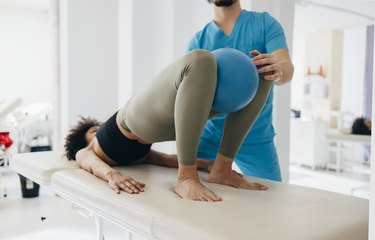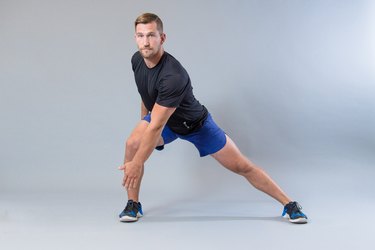
An ache or a twinge in your knee can interfere with your ability to sleep soundly. So if you're plagued by nighttime knee pain, you'll want to get to the bottom of it, and quickly.
Knee pain at night usually stems from an underlying condition or injury, Steven Yoon, MD, a board-certified physiatrist and director of the Regenerative Sports and Joint Clinic at Cedars-Sinai Kerlan-Jobe Institute in Los Angeles, California, tells LIVESTRONG.com.
Video of the Day
Video of the Day
"Most conditions that cause knee pain can occur regardless of the time. It's just that the pain may be more noticeable at night," Dr. Yoon says.
Here's a look at some of the most likely culprits, plus what you can do to feel better.
Why You Have Knee Pain at Night
It's not uncommon for knee discomfort to flare up in the evening as you're trying to sleep. That's partly because you're more likely to notice painful sensations when you don't have your daily activities to distract you.
Physiologic elements are also at play. "There's some evidence that inflammatory mediators in the knee elevate at night, and the body's natural cortisol levels that may decrease inflammation in the knee decrease at night," Dr. Yoon says.
Lying down deactivates your knee muscles, which can increase inflammatory mediators too.
So what kinds of underlying problems might trigger knee pain that feels worse once you get into bed? According to Dr. Yoon, these are the most common culprits.
1. Osteoarthritis
As a form of wear-and-tear arthritis that becomes more common with age, knee osteoarthritis (OA) happens when the cartilage that cushions your joints begins to break down. That can happen from repeatedly putting stress on your knees from high-impact activities or carrying excess weight, notes the Centers for Disease Control and Prevention (CDC).
The loss of cushioning can make your knees feel painful and stiff, as well as cause swelling. The discomfort can be especially noticeable at night, with around 70 percent of people with knee OA reporting trouble sleeping, per the Arthritis Foundation.
Fix It
There's no cure for knee OA. But you can manage your symptoms with low-impact exercise, physical therapy and weight loss, says the CDC.
Over-the-counter and prescription meds can also help reduce pain.
2. Chondromalacia
Chrondromalacia, or damage to the cartilage under the kneecap, often causes pain or tenderness in the front of your knee that gets worse when you go up or down steps, kneel or squat. But like other knee problems, it can also flare up at night, Dr. Yoon says.
Chondromalacia mostly happens in younger adults. It usually stems from an injury, like fracturing your kneecap or badly twisting your knee from running, skiing, soccer or cycling. But people who spend a lot of time on their knees, like if you're a carpet setter or tile layer, can also be affected, per Harvard Health Publishing.
Fix It
Ice and NSAID pain relievers like ibuprofen or naproxen can help take down inflammation and help your knee heal.
You'll also want to avoid high-impact activities that stress your knee and consider physical therapy to help your knee get stronger, per Harvard Health Publishing.
3. Patellar Tendinitis (Jumper's Knee)
If you play a sport that involves a lot of jumping, like basketball or volleyball, you're more likely to get patellar tendinitis, or jumper's knee. It happens when the patellar tendon, which connects your kneecap to your shin bone, gets stressed from overuse and start to tear, says the Mayo Clinic.
Patellar tendinitis causes pain between your kneecap and your shin bone. It might be mild at first, but it tends to get worse as you continue doing the activity that caused the injury.
Fix It
As with other knee injuries, rest, ice, OTC pain relievers and avoiding high-impact activities can help your knee heal.
Physical therapy can help too, by showing you stretching and strengthening exercises to improve your knee function, the Mayo Clinic notes.
4. Meniscus Tear
People who play contact sports are at risk for a meniscus tear, a common knee injury that can happen when quick pivots or forceful twisting cause tears in the knee tissue.
The injury usually starts with a popping sensation, with increasing pain, swelling and stiffness coming on over the course of two to three days, notes the American Academy of Orthopaedic Surgeons (AAOS).
As the injury worsens, your knee might start to feel like its locking up or giving out from under you.
Fix It
Again, rest, ice and OTC pain relievers can help your knee heal and reduce discomfort.
If your pain and swelling is severe, your doctor might also recommend corticosteroid injections, the AAOS says.
5. Patellofemoral Syndrome (Runner's Knee)
A dull pain around the front of the knee that's accompanied by a rubbing, grinding or clicking sound when you move your knee could be patellofemoral syndrome, or runner's knee.
It can happen from overuse (from running or walking, for example), especially if your feet tend to roll inward when you run or if you have tight hamstrings or tight Achilles tendons, according to Johns Hopkins Medicine.
Fix It
The best way to heal is to take a break from running and take steps to reduce inflammation, like apply ice, use compression and take over-the-counter anti-inflammatory pain-relievers like ibuprofen.
Stretching and strengthening exercises can help too, per Johns Hopkins Medicine.
How to Prevent Knee Pain at Night
Most knee problems will get better with rest and time. In the meantime, there are some things you can do to reduce your discomfort at night and sleep easier.
* Give your knee a break. Taking it easy during the day means less throbbing and inflammation at night, Dr. Yoon says. You'll heal faster too.
- Take a pain reliever. Over-the-counter options like ibuprofen or naproxen will reduce inflammation and swelling to dull the pain, Dr. Yoon says. Dose up shortly before bed to reduce the odds that the meds wear off in the middle of the night.
- Place a pillow between your knees. It'll give you some extra cushioning and may take some of the pressure off your tender knee.
Oftentimes, minor knee injuries will heal on their own if you go easy on the area for a while. But you should let your doctor know if at-home measures aren't helping, or if your pain is getting worse, says Dr. Yoon.
They can examine your injury to help you determine if treatments like physical therapy, steroid injections or even surgery could be helpful.
- Centers for Disease Control and Prevention: "Osteoarthritis (OA)"
- Arthritis Foundation: "Osteoarthritis and Sleep"
- Harvard Health Publishing: "Chondromalacia patella"
- Mayo Clinic: "Patellar tendinitis"
- American Academy of Orthopedic Surgeons: "Meniscus Tears"
- Johns Hopkins Medicine: "Patellofemoral Pain Syndrome (Runner's Knee)"
Is this an emergency? If you are experiencing serious medical symptoms, please see the National Library of Medicine’s list of signs you need emergency medical attention or call 911.


